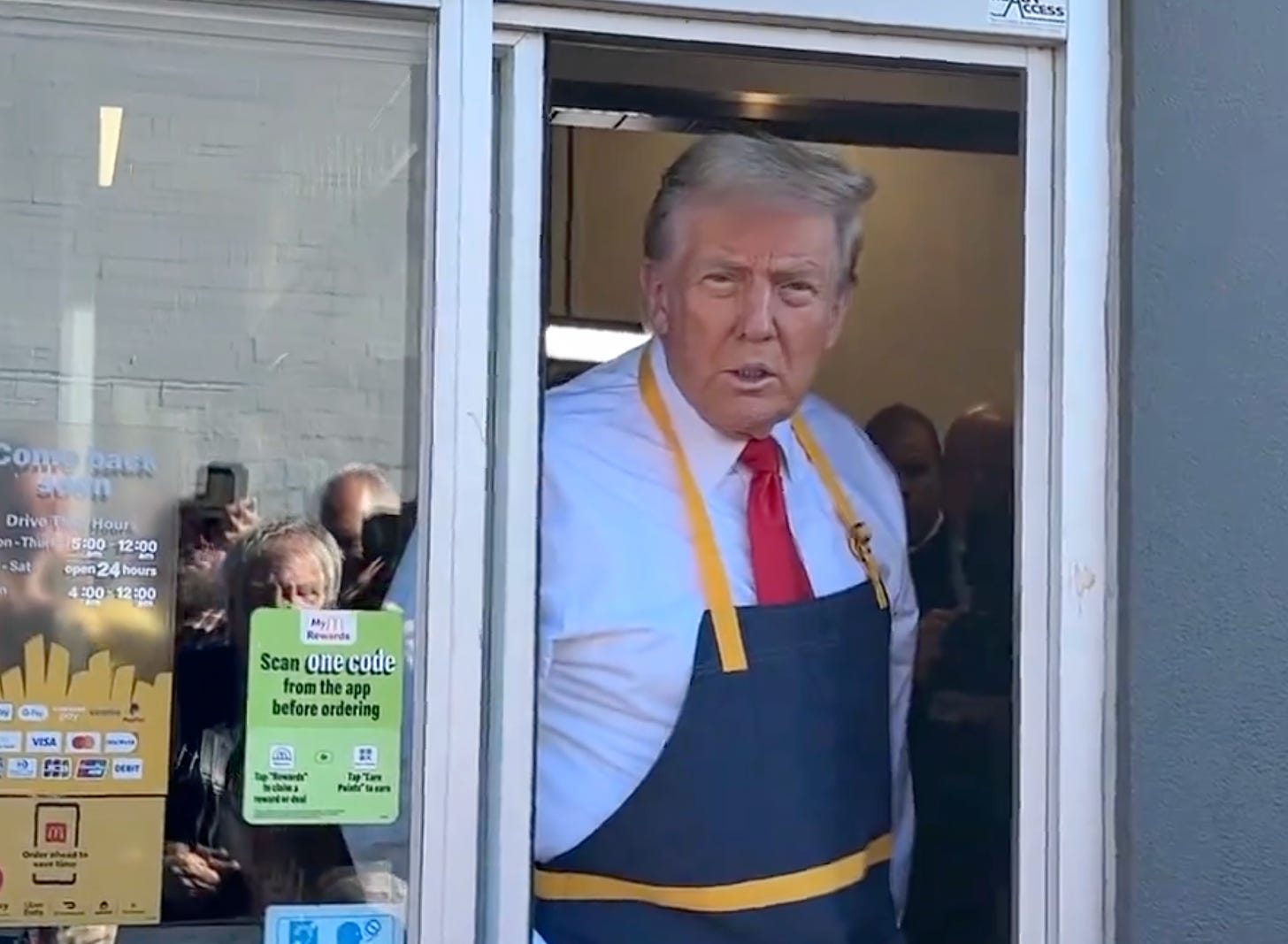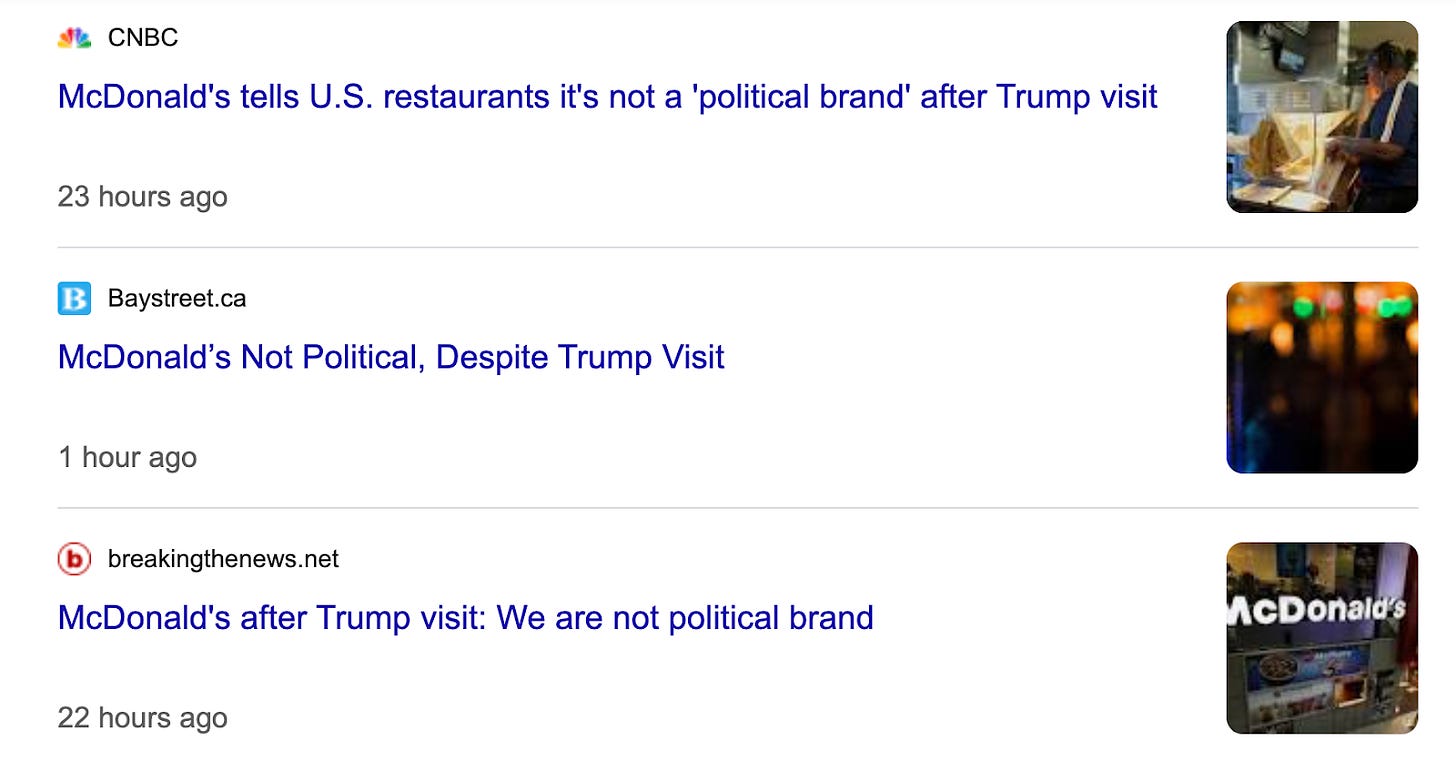McDonald’s Just Sold Us a Whopper; They’re Political as Hell
After Trump “worked” a McDonald's checkout window, McDonald’s said it’s not a “political brand”

After former Pres. Donald Trump staged a campaign appearance at a Pennsylvania McDonald’s on Sunday, national media reported yesterday that McDonald’s assured its franchise owners in an internal message that “we are not a political brand.”
In a statement Monday, McDonald’s told the media:
“McDonald’s does not endorse candidates for elected office and that remains true in this race for the next President. We are not red or blue — we are golden.”
McDonald’s may not endorse candidates, and its brand may not be political. But to say it’s not political is a little…arch. The company itself is actively political on a range of fronts.
McDonald’s gives hundreds of thousands of dollars a year to its preferred political candidates.
McDonald’s spends millions a year lobbying politicians for and against its preferred political outcomes.
McDonald’s also belongs to industry organizations that actively push political agendas around the country.
The McDonald’s website even has pages dedicated to outlining its political activities and how it approaches them.
And while McDonald’s claims it’s neither blue nor red, it’s actually both when it comes to donations. But a lot more of its gold goes to Republicans.
According to Open Secrets, political contributions data show that the McDonald’s Political Action Committee (PAC) has spent $447,908 in the 2023-2024 election cycle. Of its political donations, 34.58% have gone to Democrats. Almost twice that amount, 62.08%, went to Republicans.
That’s not an aberration. Historical data tracked by Open Secrets shows that McDonald’s has given more to Republican federal candidates than to Democrats every single year since even before Jack Doepke replaced Squire Fridell as Ronald McDonald in 1991.
And that’s just federal spending. Campaign limits are looser in some states and local jurisdictions, where companies themselves — not just their PACs — can make donations. And donation caps can be much higher.
According to McDonald’s’ own website, the company has donated to moderate Republican and Democratic governors, but also to extremist Republican governors such as Govs. Brian Kemp (R-GA) and Henry McMaster (R-SC).
The last time McDonald’s gave to Gov. Gavin Newsom (D-CA) was 2019. Since then, Newsom has championed a minimum wage hike for fast-food workers.
At least three trade organizations to which McDonald’s belongs — the International, National, and California Restaurant Associations — are part of a coalition that’s pushed skewed data to argue that California’s newly raised fast-food wages have cost jobs. (TFN unfucked this news in greater detail last month.)
Similarly, while McDonald’s is both blue and red in its federal donations, recipients include more high-profile deep red names than dark blue.
Democratic beneficiaries of McDonald’s’ largesse trend conservative. Rep. Josh Gottheimer (D-NJ) got $2,500 in July. Committees supporting Sen. Joe Manchin (I-WV) got $7,500 last year when he was still technically a Democrat.
On the other end of the spectrum, McDonald’s is comfortable supporting some of the Republican Party’s most extremist far-right congressional candidates.
The McDonald’s PAC gave $2,500 to Rep. Tim Walberg (R-MI) well after the Congressional Equality Caucus called out Walberg in response to my reporting that he offered support to Uganda’s leaders in the face of international pressure to drop their LGBTQ+ death penalty.
Another McDonald’s recipient is Rep. Kevin Hern (R-OK), whose campaign got $5,000 from McDonald’s back in May. Hern’s a former McDonald’s franchise owner and staunch Trump ally who supported the Big Mac Lie. Hern chairs the far-right Republican Study Conference and has been considered a possible House speaker.
Rep. Virginia Foxx (R-NC) got $7,500 last year. Special orders upset Foxx, so much so that she told a reporter to “shut up” while trying to order answers about the attempt to overturn Pres. Joe Biden’s 2020 election victory.
McDonald’s is so political it has established policies about its campaign giving. The company identifies four political areas where it works to influence policy: “…food quality and sourcing … our planet (e.g., climate action, conserving forests, water stewardship), community connection (e.g., community support and crisis response, food waste and donations, Ronald McDonald House Charities), and job inclusion and empowerment (e.g., human rights and respectful workplaces; diversity, equity, and inclusion, skills and education).”
But one issue stands above them all when it comes to McDonald’s political lobbying. The bottom line is the bottom line:
“The core of our public policy outreach must … be defending and promoting the franchise model that drives and sustains our business.”
That financial model — extracting money from franchise owners without taking responsibility for their actions — is, as the company says, what drives and sustains the business.
That way, for instance, McDonald’s can dodge political blowback for child labor at some of its franchises, even though the corporation wouldn’t implement a zero-tolerance policy to punish those franchise owners who exploited child labor.
The McDonald’s financial moderl is also why the company politically opposes a new rule by the Biden Labor Department that would end the have-it-your-both-ways approach of franchising its restaurants. The rule would make it easier to hold parent companies accountable for the crimes and other misdeeds of the franchises that funnel them the proceeds.
That kind of corporate accountability, McDonald’s said, “would have the devastating consequence of destroying the franchise business model that powers the U.S. economy."
So, in a federal form filed literally the same day McDonald’s was telling news media it’s not political, McDonald’s disclosed spending $720,000 on lobbying in just the third quarter of this year and just on its own lobbying — that doesn’t even count what they’ve outsourced.
Shockingly, the disclosed McDonald’s lobbying was political. McDonald’s lobbied the Senate. The House. The White House. Federal agencies.
What political issues was McDonald’s lobbying about? Taxes. The Farm Bill. Supply-chain issues. Food safety and nutrition standards. And, of course, that whole labor rule on whether McDonald’s can be held accountable for the treatment of franchise employees.
And franchise owners themselves are even more openly political than the parent. Some, for instance, mobilized politically earlier this year to kill a New York state bill that would have helped workers recover stolen wages.
Despite the millions of dollars it spends on political activities, McDonald’s got the headlines it wanted by simply asserting that it’s not political:
The reason the company said it’s not a “political brand” rather than just not political, is that it doesn’t want to be seen as political. It wants to engage in politics without people thinking about how they engage or why.
UPDATE: CNN just now reported that the Centers for Disease Control and Prevention today issued a food-safety alert for McDonald’s Quarter Pounders. The patties and slivered onions are suspected in an E. coli blamed for 49 illnesses, one of them fatal, in ten states. Food safety is one of the four areas in which McDonald’s engages in political lobbyings.
You can support this kind of analysis and context as a corrective to the passivity of corporate media by making a one-time donation or becoming a paid subscriber. Thanks for your support.






I didn’t really need much of a reason to boycott McDonalds. Letting that prick stage a photo op at one of them is more than sufficient.
Thanks for this detailed answer to a question I had about it being a franchise. The devil really is in the details.